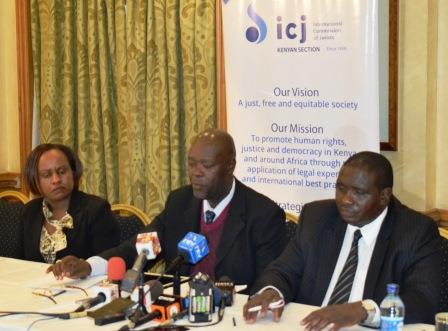By Sarah Nyakio
It has been over a decade now since the 2007 post-election and internally displaced people are still languishing in poverty. On Saturday July 14, 2018 ICJ Kenya visited Ndonga farm in Subukia, Kenya which is an internally displaced people (IDP) camp.
More than 16,000 people were affected during the 2007 post-election violence experienced in the country. The ethnically instigated violent protests affected minorities living outside their traditional or habitual settlement regions in parts of Rift Valley, Nyanza and Central provinces which left some as IDPS.
In 2008, the Government of Kenya launched the Operation Rudi Nyumbani initiative whose mandate was to help IDPs to return to their homes. Those who had sought refuge at the Nakuru Show Ground were offered Ksh 10,000 as start-up and restructuring money to support them in returning and re-starting their livelihoods.
However, most of them were unable to go back to their original settlements since they were previously squatters from Molo, Makongeni, and Pipeline in Nakuru County.
In a move to resettle the IDPs left in the Nakuru Show Ground, the government bought land in 2009 to resettle 267 IDPs at the Ndonga Farm in Subukia Constituency. The IDPs occupied the land on September 13, 2011. Unfortunately, a case was filed by Ndonga sisters following internal disagreements. The sisters obtained court orders that restrained the government from taking possession of the land and allocating it to the IDPs until the case they filed is heard and determined.
Despite the court order, the IDPs still resettled in the farm however, it has derailed the IDPs from doing anything meaningful on the farm including farming and building permanent structures. Since 2011, the case has not made any progress. The IDPS are living in deplorable conditions and facing numerous problems
Some of them talked to us and explained the problems they were facing which are:
- They cannot carry out meaningful development on the parcel of land due to the court order.
- They are not allowed to build schools, health centers and they have been generally isolated from other Kenyans. The residents at the camp have to walk for long distances to access hospitals, schools, churches, police stations and other social amenities.
- Inadequate services; they cannot access CDF for their children’s education, fertilizer from the government, funds for the elderly, burial permits, birth certificates; on June 16, 2018 they forcefully buried one of their members at the farm after being denied the burial permit.
- Limited access to the farm. They are not allowed to farm the land or build permanent structures. Due to necessity, they have forcefully planted crops to sustain their families.
- Post-poll trauma. Some of them have not recovered from the skirmishes following the 2007 disputed presidential election.
- Lack of support from the relevant agencies. Follow-ups with the government have been fruitless as their cries have fallen on deaf ears; from the local administration, the area MP, to the office of the President.
- Harassment by the police. They have been intercepted and stopped by the police from staging peaceful demonstrations to agitate for their rights.
- Harassment by the local administration when they seek for services such as burial permits. They have been forced to bury their family members at a public cemetery against their wishes.
- Lack of inclusion in enjoyment of their ECOSOC rights; they do not engage in any public participation exercises for fear of exposing their challenges to the public.
- Insecurity and constant threat of violence by their neighbors; the IDPs claim that they have on several occasions volunteered information to the local administrator about threats and impending attacks but no action has been taken. They have been attacked twice and some of their construction materials stolen. Their families; especially women and children are left vulnerable since they are left at the camp as their abled men work outside and far from the camp.
- Risk of land slide; the land is inaccessible when it rains heavily. Follow up with the chief and other agencies like Red Cross has not been successful.
Regardless of the problems the people face, they have been able to educate their children. The Ndonga farm case which dates back to 2011 has prevented the IDPs from benefiting from various development projects. They sought the services of an advocate to assist them with the case but they are concerned at the slow progress of the case, they wish the matter would be expeditiously determined. They also wish to be compensated so that they can go back to their normal lives.
An examination of the court orders vide Petition No. 26 of 2011 (filed by the Donga sisters) indicated that it’s a constitutional petition alleging violations of Article 40 on the protection of right to property and Article 27 on equality and freedom from discrimination. The Donga farm IDPs are only interested parties, with the Attorney General and the Ministry of Lands as the respondents.
ICJ Kenya advised the IDPs through their representatives to get the following list of documents;
- A copy of the petition
- The Application dated October 15 2011.
- Any response from the Respondents in the case
- Any other pleadings or submissions made by the interested parties
The documents would be scrutinized, in preparation for the next hearing of the matter dated October 23, 2018 with a view of making an application for review of the interim orders on October 19, 2018.
ICJ Kenya is committed to ensure that the victims of the post-election violence (IDPs) are assisted to get back to their normal lives









